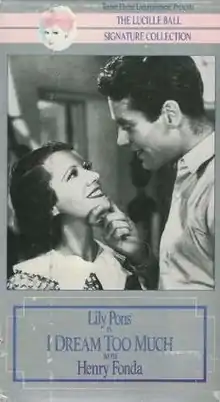I Dream Too Much (1935 film)
I Dream Too Much is a 1935 American romantic comedy film directed by John Cromwell. It stars Henry Fonda, Lily Pons, and Lucille Ball in one of her earlier roles. It has been described as a "somewhat wispy operetta."[2] Songs are by Jerome Kern and Dorothy Fields. The film was nominated for an Academy Award in the category Sound Recording (Carl Dreher).[3]
| I Dream Too Much | |
|---|---|
 | |
| Directed by | John Cromwell |
| Produced by | Pandro S. Berman |
| Written by | Elsie Finn David G. Wittels |
| Screenplay by | James Gow Edmund H. North |
| Starring | Lily Pons Henry Fonda Eric Blore Lucille Ball |
| Music by | Jerome Kern Dorothy Fields Max Steiner (incidental) |
| Cinematography | David Abel |
| Edited by | William Morgan |
| Distributed by | RKO Radio Pictures |
Release date |
|
Running time | 97 minutes |
| Country | United States |
| Language | English |
| Budget | $627,000[1] |
| Box office | $640,000[1] |
Plot
Annette Monard Street (Lily Pons) is an aspiring singer, who falls in love with and marries Jonathan Street (Henry Fonda), a struggling young composer.
Jonathan pushes her into a singing career, and she soon becomes a star. Meanwhile, Jonathan is unable to sell his music, and he finds himself jealous of his wife's success.
Concerned about their relationship, Annette uses her influence to get Jonathan's work turned into a musical comedy. Once she achieves this, she then retires from public life in order to raise a family.
Cast
- Lily Pons as Annette Monard Street
- Henry Fonda as Jonathan 'Johnny' Street
- Eric Blore as Roger Briggs
- Osgood Perkins as Paul Darcy
- Lucien Littlefield as Hubert Dilley, Tourist
- Lucille Ball as Gwendolyn Dilley, Tourist
- Mischa Auer as Darcy's Pianist
- Paul Porcasi as Uncle Tito
- Scotty Beckett as Boy on Merry-Go-Round
Reception
Writing for The Spectator in 1936, Graham Greene gave the film a poor review. Greene criticized Jerome Kern's musical score as "pompous and middle-aged" in contrast to the times which were more in line with fresh musicians like Cole Porter, and he complained that Grace Moore's performance had seemed "ponderous". The only portion of the film that Greene found to provide a light touch was that of the performing seal.[4]
The film recorded a loss of $350,000.[1]
References
- Richard Jewel, 'RKO Film Grosses: 1931-1951', Historical Journal of Film Radio and Television, Vol 14 No 1, 1994 p58
- Woolsey, John Munro (1938). "Shipman et al. v. RKO Radio Picture, Inc. et al". Federal Supplement: Cases Argued and Determined in the District Courts of the United States Court of Claims. St. Paul, MN: West Publishing Co. 20: 249–251.
- "The 8th Academy Awards (1936) Nominees and Winners". oscars.org. Retrieved 2011-08-07.
- Greene, Graham (21 February 1936). "I Dream Too Much/Anything Goes/Faust/Hohe Schule/Captain Blood". The Spectator. (reprinted in: Taylor, John Russell, ed. (1980). The Pleasure Dome. p. 53. ISBN 0192812866.)